History
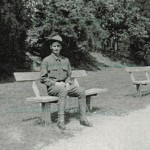 Since my oldest grandson, Chris Petersen turned eighteen last February 28th, and had to register for the draft, and my grandson, Caalab Royce will be registering in June after he turns eighteen this year on the 25th, I have wondered a little more about the making of a soldier…in any war. Since the draft is something that almost never happens these days, it was not a real priority in my mind, however. Then I started looking at my Aunt Bertha Hallgren’s journal again, because she was such a great writer, and because I haven’t referred to her work in a while. I stumbled across a reference she makes to the experience of a World War I soldier. Since my grandfather, George Byer fought in World War I, that part of her journal made me curious.
Since my oldest grandson, Chris Petersen turned eighteen last February 28th, and had to register for the draft, and my grandson, Caalab Royce will be registering in June after he turns eighteen this year on the 25th, I have wondered a little more about the making of a soldier…in any war. Since the draft is something that almost never happens these days, it was not a real priority in my mind, however. Then I started looking at my Aunt Bertha Hallgren’s journal again, because she was such a great writer, and because I haven’t referred to her work in a while. I stumbled across a reference she makes to the experience of a World War I soldier. Since my grandfather, George Byer fought in World War I, that part of her journal made me curious.
The story Aunt Bertha wrote was funny to a large degree, although I doubt that the soldier she wrote abut thought it was funny exactly. I suppose that as a eighteen year old boy, at a time when education was not always the top priority, he did not always understand the new to him words that were being thrown at him, being asked if you were an alien, might make you wonder if they were asking if you were sick right now, but the humor was somehow lost on the officer who was asking the questions. And when he asks you your name, and he has known you all your life, because he’s your milkman, it might be hard not to say, “You know my name.” Nevertheless, you must quickly learn that knowing you in life and knowing you in the military are obviously two very different things. You had better just answer the question and not act like a smart-aleck.
After getting past the registration area, and getting the feeling that these guys didn’t expect you to make it past the first week in combat, you might start looking for the door, and wondering if there was any way to make them believe you were only seventeen after all. Nevertheless, the line moved forward, and there was no way to get out of it, so you followed along. At some point you were issued a uniform, which the soldier Bertha was talking about described as one of two sizes…too small or too big. He pointed out that the pants were so tight that he didn’t dare sit down, and the shoes were so big that he could “turn around twice, and they didn’t move”. Sadly, I think that is the way it was during World War I. A guy could probably deal with the loose fitting clothes, but those tight ones wouldn’t last long. And to make matters worse for our particular soldier, he passed an officer, who immediately asked him if he had noticed the uniform the officer was wearing. In his typical eighteen year old mouthiness, and his lack of understanding the meaning of the question, our new soldier, asked why the officer was complaining. Hadn’t he seen how ill fitting the soldiers uniform was after all. I seriously doubt if the officer saw the humor in that.
After another mouthy session, the soldier found himself digging a hole…then being told to dig another one to throw the dirt into. I guess you can see where this task was heading. If our soldier didn’t figure out pretty fast 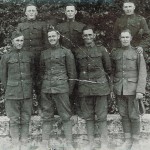 that he needed to keep his sarcasm to himself, then it is my guess that he spent a lot of time peeling potatoes, scrubbing floors, and digging holes…when he wasn’t fighting for his life that is. As time went on, I’m sure he figured out that they didn’t care about his opinion, and if he gave it anyway, he was going to wish he hadn’t. While this type of soldier would not really make a great soldier, he would probably have made a funny movie. I’m sure he got over the need to be funny once the bullets started flying too. By the way, I really don’t recommend that any of the soldiers, who might be coming up the ranks, act this way. I think that while sarcasm in school might make you the class clown, and make you popular with your friends, because that’s what kids do, it will not have the same affect on your commanding officer in any way, shape, or form.
that he needed to keep his sarcasm to himself, then it is my guess that he spent a lot of time peeling potatoes, scrubbing floors, and digging holes…when he wasn’t fighting for his life that is. As time went on, I’m sure he figured out that they didn’t care about his opinion, and if he gave it anyway, he was going to wish he hadn’t. While this type of soldier would not really make a great soldier, he would probably have made a funny movie. I’m sure he got over the need to be funny once the bullets started flying too. By the way, I really don’t recommend that any of the soldiers, who might be coming up the ranks, act this way. I think that while sarcasm in school might make you the class clown, and make you popular with your friends, because that’s what kids do, it will not have the same affect on your commanding officer in any way, shape, or form.
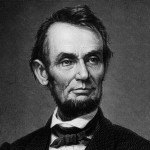 Probably my favorite historical President, would have to be Abraham Lincoln. Even in elementary school, I found his political acts to be most interesting. Of course, my favorite speech would have to be the Gettysburg Address. Every time I hear that speech, I get Goosebumps. I’m sure I’m not alone in that either. That was such a moving speech. It was at a time when our nation was severely divided, and on the brink of splitting in two. No one could agree on what we should be like. And yet, I believe that Lincoln made the right call. Owning slaves was wrong, and if it took a war to free them, then that was the way it would have to be. I am also glad that our nation did not divide, as I think we are a great nation because of our strongly united stance.
Probably my favorite historical President, would have to be Abraham Lincoln. Even in elementary school, I found his political acts to be most interesting. Of course, my favorite speech would have to be the Gettysburg Address. Every time I hear that speech, I get Goosebumps. I’m sure I’m not alone in that either. That was such a moving speech. It was at a time when our nation was severely divided, and on the brink of splitting in two. No one could agree on what we should be like. And yet, I believe that Lincoln made the right call. Owning slaves was wrong, and if it took a war to free them, then that was the way it would have to be. I am also glad that our nation did not divide, as I think we are a great nation because of our strongly united stance.
Apparently, our nation agrees with me on just how great Abraham Lincoln was too, because on this day…his birthday…in 1914, the first stones were laid for the Lincoln Memorial. I doubt that the connection was lost to those who  were doing the work on the splendid memorial, and maybe the work had officially been planned for that day for that very reason. Lincoln was known as the “Saviour of the Union” because of his actions to keep our nation together. The inscription reads, “In this temple, as in the hearts of the people for whom he saved the Union, the memory of Abraham Lincoln is enshrined forever.” And beneath these words, the 16th President of the United States sits immortalized in marble as an enduring symbol of unity, strength, and wisdom. I have to wonder if Lincoln would have been embarrassed or humbled by such a display. I’m sure he would be humbled, but I also think that because Lincoln was such a humble man, he would have also been a bit embarrassed.
were doing the work on the splendid memorial, and maybe the work had officially been planned for that day for that very reason. Lincoln was known as the “Saviour of the Union” because of his actions to keep our nation together. The inscription reads, “In this temple, as in the hearts of the people for whom he saved the Union, the memory of Abraham Lincoln is enshrined forever.” And beneath these words, the 16th President of the United States sits immortalized in marble as an enduring symbol of unity, strength, and wisdom. I have to wonder if Lincoln would have been embarrassed or humbled by such a display. I’m sure he would be humbled, but I also think that because Lincoln was such a humble man, he would have also been a bit embarrassed.
Abraham Lincoln came from humble beginnings. He was raised in what was then the western frontier in Kentucky and Indiana. He was mostly self educated, and became a lawyer in Illinois. He was a member of the 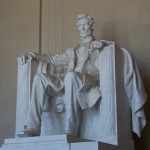 Whig Party, which is now gone, and then became a member of the Republican Party in 1854. He hated slavery and spoke out against it many times. He didn’t have much support in the South, of course, but he swept the Northern states and became president in 1860. He also reached out to the War Democrats, those who supported the war. He also confronted the Republicans who wanted to punish the South after the war, and called for more compromise with the anti-war Democrats who hated him…trying to bring peace within the government even before the war ended. Nevertheless, just six days after Robert E Lee surrendered, President Abraham Lincoln was assassinated by John Wilkes Booth, who was a Confederate sympathizer. Today, we remember Abraham Lincoln on the 206th anniversary of his birth.
Whig Party, which is now gone, and then became a member of the Republican Party in 1854. He hated slavery and spoke out against it many times. He didn’t have much support in the South, of course, but he swept the Northern states and became president in 1860. He also reached out to the War Democrats, those who supported the war. He also confronted the Republicans who wanted to punish the South after the war, and called for more compromise with the anti-war Democrats who hated him…trying to bring peace within the government even before the war ended. Nevertheless, just six days after Robert E Lee surrendered, President Abraham Lincoln was assassinated by John Wilkes Booth, who was a Confederate sympathizer. Today, we remember Abraham Lincoln on the 206th anniversary of his birth.
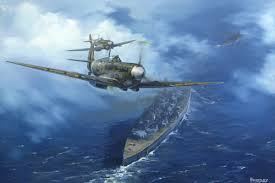 In any war, each side has just one goal in mind…winning. Of course, this is not just a video game or war games, but it is really a life and death challenge. In retrospect, I find it interesting to see some of the strategies the different sides use. While I cannot agree with anything the Germans did under Hitler’s rule, because Hitler was unbelievably ruthless, hateful, and cruel, there were some strategies that either he, his admirals, or his soldiers executed that were quite spectacular, though surprising in nature, because the Germans didn’t usually coordinate their efforts this well. I would never have wanted the Germans to win in World War II, because of their horrible treatment and murders of the Jewish people, but they did have a way of fighting that has captured my interest…at least on this day.
In any war, each side has just one goal in mind…winning. Of course, this is not just a video game or war games, but it is really a life and death challenge. In retrospect, I find it interesting to see some of the strategies the different sides use. While I cannot agree with anything the Germans did under Hitler’s rule, because Hitler was unbelievably ruthless, hateful, and cruel, there were some strategies that either he, his admirals, or his soldiers executed that were quite spectacular, though surprising in nature, because the Germans didn’t usually coordinate their efforts this well. I would never have wanted the Germans to win in World War II, because of their horrible treatment and murders of the Jewish people, but they did have a way of fighting that has captured my interest…at least on this day.
The Germans had controlled and occupied France since June of 1940. Their ships docked in French ports were drawing fire from the British. It became clear that the ships needed to escape. The German battleships Gneisenau and Scharnhorst had been anchored at the port of Brest since March of 1941, and the heavy cruiser, Prinz Eugen had been there since May of 1941. They were periodically subjected to bombing raids and damage at the hands of the British. Now it was time to turn a bad situation into a successful failure, as it were. The Germans knew they were not going to hold onto France here, so now they needed to steal away in the night without getting caught.
It was decided that they would make a mad dash up the English Channel to the safety of German waters. The 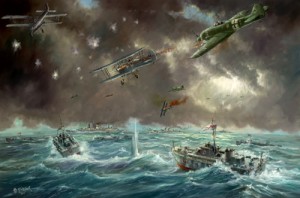 key here was to make the Channel Dash right under the watchful eye of the British Royal Navy without their notice. It was quite risky. Despite the watchfulness of the British submarines and aircraft, the German Vice Admiral, Otto Ciliax launched Operation Cerberus to lead the ships out of the French port, and to the safety of the German ports.
key here was to make the Channel Dash right under the watchful eye of the British Royal Navy without their notice. It was quite risky. Despite the watchfulness of the British submarines and aircraft, the German Vice Admiral, Otto Ciliax launched Operation Cerberus to lead the ships out of the French port, and to the safety of the German ports.
On the evening of February 11, 1942, they set their plan in motion. Accompanied by six German destroyers and twenty one torpedo boats for protection, they moved north late that evening. When daylight hit, they were joined by German planes to provide air cover as well. The air cover was led by ace pilot, Adolf Galland. He was joined by 250 other fighters in a coordinated joint effort of the German Navy and the Luftwaffe…an unusually well coordinated joint effort. The British Royal Navy scrambled to coordinate its own attack, but the late start would prove to be the undoing of the attack, because they did not realize that the escape was in progress until the afternoon of February 12th. All three of the German warships made it to a German port on February 13th, although the Gneisenau and had incurred damaged by British mines along the route. In addition to the embarrassment of the well planned escape that was carried out by the Germans, the British lost 40 aircraft and six Navy Swordfish during their confrontation. The Germans, on the other had, only lost one torpedo boat and 17 aircraft.
Nevertheless, the British would exact a revenge of sorts, when British warships sunk the Scharnhorst in December of 1944, as it attempted to attack a Russian convoy. The Gneisenau was destroyed during a bombing raid, while it was still being repaired from the prior damage, and the Prinz Eugen survived the war, but 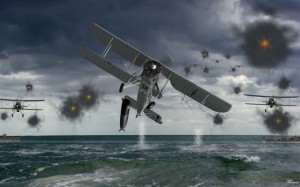 was taken over by the US Navy at the end of the war. It isn’t that I want to commend the Germans for their sneaky escape, because I don’t. They simply lived to fight…and ultimately lose, another day. It was, however, a good strategy, and I guess that even crazy dictators like Hitler, and the men he trained, could come up with an occasional good escape plan. Nevertheless, evil must not be allowed to continue, and the Germans had to be shut down, so the British, and all the other nations who stand for what is good, had to continue to fight, until Germany and its allies had no choice but to surrender. Still, February 11, 1942, the day of The Channel Dash would stand out as one of the best fights put up by the Germans, or at least, the best escape plan.
was taken over by the US Navy at the end of the war. It isn’t that I want to commend the Germans for their sneaky escape, because I don’t. They simply lived to fight…and ultimately lose, another day. It was, however, a good strategy, and I guess that even crazy dictators like Hitler, and the men he trained, could come up with an occasional good escape plan. Nevertheless, evil must not be allowed to continue, and the Germans had to be shut down, so the British, and all the other nations who stand for what is good, had to continue to fight, until Germany and its allies had no choice but to surrender. Still, February 11, 1942, the day of The Channel Dash would stand out as one of the best fights put up by the Germans, or at least, the best escape plan.
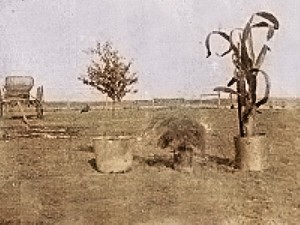
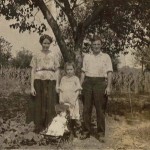 I have often wondered what our nation looked like before the Native Americans altered the landscape with the only way they really had of clearing the land…fire. When the summer grasslands would grow so tall that it made travel by horse or on foot troublesome, the Indians just started a fire to clear the area. Since there was nothing standing in the way of the fire, it ran until it came to a river or some other kind of obstacle, such as an area void of vegetation, and then it simply burned itself out. Of course, rain or snow would have the same effect too. I wonder, like many other people do, if prior to that practice, there were forests where we now have plains.
I have often wondered what our nation looked like before the Native Americans altered the landscape with the only way they really had of clearing the land…fire. When the summer grasslands would grow so tall that it made travel by horse or on foot troublesome, the Indians just started a fire to clear the area. Since there was nothing standing in the way of the fire, it ran until it came to a river or some other kind of obstacle, such as an area void of vegetation, and then it simply burned itself out. Of course, rain or snow would have the same effect too. I wonder, like many other people do, if prior to that practice, there were forests where we now have plains.
Of course, the White Man, has come a long way in trying to bring trees back into our nation, but there are still many places that are just wide open spaces filled with prairie grass, sagebrush, and cactus. When my grandparents, Anna and Allen Spencer decided to move to Texas to check out the booming oil industry, they found a land that seemed to run for hundreds of miles, with little to see, but wide open spaces. Like many people, they longed for trees, and other vegetation to give a different view to the land they found themselves living on. Having lived on five acres myself for a number of years before moving into town, I can certainly understand wanting trees. That didn’t make it easy to grow any of them up to much size, however. I suppose it  might have been easier in Texas, due to their warmer climate.
might have been easier in Texas, due to their warmer climate.
I understand the need Native Americans had to clear the land, and the lack of sufficient tools to do so, when it was necessary. Nevertheless, I wish they had not burned down the trees…or the prairies, because that stopped the young trees from growing, and lets face it…we need trees for shade, and the very air we breathe. These days, with all the necessary tools, from lawnmowers to farm equipment, there is no need to burn down the prairie grass to keep it from getting so deep, so clearing the land is a much smoother project. The older I get, the more I find myself wanting trees around me, and while it is still hard to get them up to some size, due mainly to the deer that roam freely inside the city limits of Casper, Wyoming, I do have some volunteer Silver Birch trees that have moved themselves from the neighbors tree into our yard.
We were so excited when the first tree started coming up, but our neighbor, Bill thought we would be upset about the little trespassing trees, and so he cut the down…until we told him that we wanted them. Then he left them alone so we could decide to let them grow or not. That first tree is now taller that our house, and we have several in the back yard too. Before these trees began growing, we had three cedar bushes in our front yard, one that was let grow to the size of a rather ugly tree. Finally, the day came that we got one of those little trespassing trees to come up in the right place. While we liked the bushes, that ugly Cedar tree needed to go. Then that tree got to an area where it could work for what we wanted. This past summer, it had grown to the 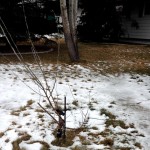
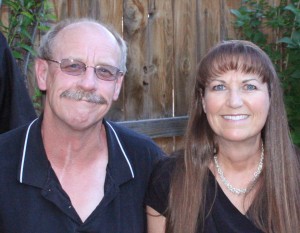 point of being about my height. Life was good. We cut down that ugly Cedar bush that had been pretending to be a tree, and watch with excitement as our new little trespassing tree grew and flourished…and then it happened. The deer that I love to have in our yard, because they are so beautiful…decided that our little tree was just the right size for lunch. It’s hard to say if it will come back in the spring, but if not, there will be another little trespasser to grow in its place…life is still good!!!
point of being about my height. Life was good. We cut down that ugly Cedar bush that had been pretending to be a tree, and watch with excitement as our new little trespassing tree grew and flourished…and then it happened. The deer that I love to have in our yard, because they are so beautiful…decided that our little tree was just the right size for lunch. It’s hard to say if it will come back in the spring, but if not, there will be another little trespasser to grow in its place…life is still good!!!
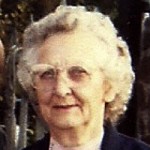 I’m sure that most of you have heard that funny song by Ray Stevens called, “I’m My Own Grandpa”, and while I’m not going to tell you that I’m my own grandma, I will tell you that my husband’s Grandma Hein is my 12th cousin twice removed. We always enjoyed both of his grandmothers, but we got to see so much less of Grandma Hein, that it was very special when we got to go see her. I only knew one of my grandmothers, and my she passed away when Bob and I had only been married eleven years. His Casper grandparents died in the 80’s too, as did his Grandpa Schulenberg in Montana. So, much of my adult life was spent having only Bob’s Montana grandparents, Grandma and Grandpa Hein, in my life. I loved spending time with them, and we made annual trips up to visit them. We wanted our girls to know them too, so the trips were a special family time for all of us.
I’m sure that most of you have heard that funny song by Ray Stevens called, “I’m My Own Grandpa”, and while I’m not going to tell you that I’m my own grandma, I will tell you that my husband’s Grandma Hein is my 12th cousin twice removed. We always enjoyed both of his grandmothers, but we got to see so much less of Grandma Hein, that it was very special when we got to go see her. I only knew one of my grandmothers, and my she passed away when Bob and I had only been married eleven years. His Casper grandparents died in the 80’s too, as did his Grandpa Schulenberg in Montana. So, much of my adult life was spent having only Bob’s Montana grandparents, Grandma and Grandpa Hein, in my life. I loved spending time with them, and we made annual trips up to visit them. We wanted our girls to know them too, so the trips were a special family time for all of us.
After so many years of knowing them, Grandma and Grandpa Hein became my own grandparents. Little did I know then, or at any time during her lifetime, that Grandma Hein was actually my 12th cousin twice removed. When I made that connection a short time ago, I was so surprised. I’ve known for some time now that Bob and I are cousins to varying degrees, but somehow, in my mind, that didn’t officially connect to the prior ancestors. I mean, I knew it, but they didn’t feel like cousins, for some reason. Then I started thinking about that with respect to Grandma Hein when I came across a relationship between her dad’s family and my dad’s family. Somehow, it was at this point that my mind completed wrapping itself around the idea that I was related to Grandma’s family, and it hit me that my grandma was my cousin.
I’m sure that should have hit me before too, but somehow, she was Bob’s grandma, and therefore, mine by marriage, which she technically still is, in addition to our cousinship. I really wish I had know that she was my cousin too, because I think we would have liked that relationship too. I’m sure we would have both been surprised, and we probably would have had a good laugh too. Nevertheless, I think that we both would have liked that fact as well. We were always good friends, so being cousins too, would have been fun.
The cousinship occurred before either of us were ever born, of course. Our common ancestor is John Collamore  who is my 11 great grandfather, and Grandma’s 13th great grandfather, was born in 1500 in England. The fact that we were cousins could not have been easily known at the time of my marriage to Bob. The internet didn’t exist then, and so people had to go to these places to study their lineage. Too much time and too great a cost usually stopped that unless you were very determined. Nevertheless, whether we knew it or not, we are cousins, and I’m sure we will enjoy that conversation when we see each other again in Heaven. Today would have been Grandma Hein’s 106th birthday…and, Groundhog Day, a fact that she liked. Happy birthday Cousin Grandma Hein!! And happy Groundhog Day too…not that it matters in Heaven!! We love and miss you very much!!
who is my 11 great grandfather, and Grandma’s 13th great grandfather, was born in 1500 in England. The fact that we were cousins could not have been easily known at the time of my marriage to Bob. The internet didn’t exist then, and so people had to go to these places to study their lineage. Too much time and too great a cost usually stopped that unless you were very determined. Nevertheless, whether we knew it or not, we are cousins, and I’m sure we will enjoy that conversation when we see each other again in Heaven. Today would have been Grandma Hein’s 106th birthday…and, Groundhog Day, a fact that she liked. Happy birthday Cousin Grandma Hein!! And happy Groundhog Day too…not that it matters in Heaven!! We love and miss you very much!!
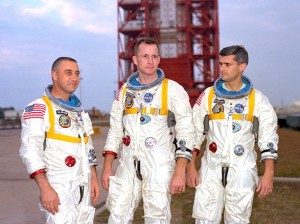
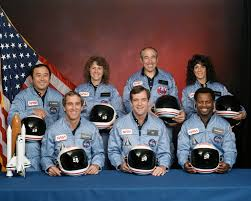 The NASA Space Program had suffered relatively few losses during it’s many years of existence, but when something happens, it is felt around the world. Like a plane crash, it hits everyone very hard. What I find very strange is the fact that NASA’s three tragedies that brought about loss of life, while years apart, all took place within a week’s time of each other. All three of these losses were very different in how they happened. The January 27, 1967 fire on the launch pad that took the lives of Virgil “Gus” Grissom, Edward White II, Roger Chaffee in a routine ground test of the capsule that would later become Apollo 1 was a fire started by an electrical spark. The fire engulfed their high-pressurized, pure-oxygen cabin, and the astronauts suffocated. There was no emergency release on the door. They couldn’t get out. The Challenger, was lost on the 28th of January, 1986. It blew up during launch because an O-ring failed when the fuel tanks were stirred, killing all seven of the astronauts, and leaving the nation in mourning at the loss of Francis “Dick” Scobee, Ron McNair, Mike Smith, Ellison Onizuka, Judy Resnik, Greg Jarvis, and Christa McAuliffe.
The NASA Space Program had suffered relatively few losses during it’s many years of existence, but when something happens, it is felt around the world. Like a plane crash, it hits everyone very hard. What I find very strange is the fact that NASA’s three tragedies that brought about loss of life, while years apart, all took place within a week’s time of each other. All three of these losses were very different in how they happened. The January 27, 1967 fire on the launch pad that took the lives of Virgil “Gus” Grissom, Edward White II, Roger Chaffee in a routine ground test of the capsule that would later become Apollo 1 was a fire started by an electrical spark. The fire engulfed their high-pressurized, pure-oxygen cabin, and the astronauts suffocated. There was no emergency release on the door. They couldn’t get out. The Challenger, was lost on the 28th of January, 1986. It blew up during launch because an O-ring failed when the fuel tanks were stirred, killing all seven of the astronauts, and leaving the nation in mourning at the loss of Francis “Dick” Scobee, Ron McNair, Mike Smith, Ellison Onizuka, Judy Resnik, Greg Jarvis, and Christa McAuliffe.
The third NASA loss took place on February 1, 2003, and this one happened on re-entry into our atmosphere. The damage that caused the demise of the Space Shuttle Columbia happened during the launch, when a piece of foam insulation broke off and damaged the leading edge of the wing. When the shuttle re-entered the Earth’s atmosphere, the wind and heat entered the wing and blew it apart, because the heat-resistant tiles covering the left wing’s leading edge had been damaged or were missing. Pieces of the shuttle began raining down across Texas, as well as the bodies of the astronauts. This loss was very different than the others, in that is was a much less controlled situation. The prior losses could be cordoned off and kept out of the public view, but the way that Columbia was damaged, far above the Earth, causing it to rain down over such a large area, made it impossible to control, and consequently, people were coming across bodies and debris. I can’t imagine anything worse, because these were our beloved astronauts, and this was such an undignified end. It was heart wrenching for everyone in this nation. We will always remember Rick Husband, Willie McCool, Michael Anderson, Kalpana Chawla, David Brown, Laurel Clark and Israeli astronaut Ilan Ramon.
With the end of the space shuttle portion of the NASA program, the future of our nation’s work in space seems to be in question. It is hard for me to imagine going from the Space Shuttle, with the amazing ability to land like an airplane, back to a rocket. The new Orion rocket is designed to go further that any other spacecraft, and 
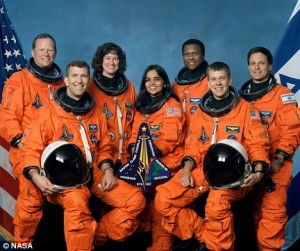 the astronauts are used to living in space for six months at a time, so the possibilities are endless, and only time will tell. With each loss come a new wisdom and increased knowledge about the things that make our astronauts unsafe, and what things can keep them safe on their journeys into the unknown. Today, however, is a day to remember NASA’s lost ones on the twelfth anniversary of the loss of the Space Shuttle Columbia.
the astronauts are used to living in space for six months at a time, so the possibilities are endless, and only time will tell. With each loss come a new wisdom and increased knowledge about the things that make our astronauts unsafe, and what things can keep them safe on their journeys into the unknown. Today, however, is a day to remember NASA’s lost ones on the twelfth anniversary of the loss of the Space Shuttle Columbia.
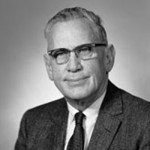 There are so many things that we have now that make life easier. Washing machines, dish washers, clothes dryers, telephones and cell phones, computers, refrigerators, and television…just to name a few, are inventions that have simplified our lives, and made things more fun. But, there are also things that we often give no thought to at all, and yet without them, things would be a lot more difficult. Just think for a moment. Try to name the little inventions that make life easier…the potato peeler, glue, ink pens, and the one, I’m specifically talking about today…Scotch Tape.
There are so many things that we have now that make life easier. Washing machines, dish washers, clothes dryers, telephones and cell phones, computers, refrigerators, and television…just to name a few, are inventions that have simplified our lives, and made things more fun. But, there are also things that we often give no thought to at all, and yet without them, things would be a lot more difficult. Just think for a moment. Try to name the little inventions that make life easier…the potato peeler, glue, ink pens, and the one, I’m specifically talking about today…Scotch Tape.
In years gone by, people had to tie their wrapping paper in place with a ribbon or cord to wrap presents. And what about torn papers…especially important papers that can’t be replaced. You always hope you never tear these things, but sometimes it can’t be helped, and rather than throw it away, the best solution is to tape it. Scotch tape has improved greatly since it was first manufactured, and these days, the things taped will often stay together a lifetime, without yellowing. If you’ve ever looked at  an old scrapbook, you might find some of that old tape, and see that everything around it is now yellow and ugly. The glue used just wasn’t as good as it is now. Nevertheless, tape then was far better than having none at all, because before that, if something was torn, it stayed torn, or had to be reproduced by hand.
an old scrapbook, you might find some of that old tape, and see that everything around it is now yellow and ugly. The glue used just wasn’t as good as it is now. Nevertheless, tape then was far better than having none at all, because before that, if something was torn, it stayed torn, or had to be reproduced by hand.
When it comes to Scotch Tape, you can thank one Richard G Drew, who was an engineer working for 3M Company, also known as Minnesota Mining and Manufacturing. Drew, who was born in 1899 and died in 1980, and not a relative that I know of, first invented masking tape made for painters in 1923 which was designed to help painters paint a straight border between two colors. You will find that this product is still is use today, although it too has gone through some improvements. This early masking tape was a wide paper tape with adhesive on only the edges of the tape and not in the middle…which would seem odd to us now. Then in 1930, he made an improved, all purpose tape called Scotch (TM) Brand Cellulose Tape. This tape was clear, and worked so well, that it was soon adopted worldwide. Of course, with the invention of the tape, came the need for a dispenser, which Drew’s co-worker, John A Borden obligingly made, with a built- in cutting edge, in 1932. Production of this new and clear all-purpose tape began on this day, January 31, 1930.
in cutting edge, in 1932. Production of this new and clear all-purpose tape began on this day, January 31, 1930.
It was a little invention that in many ways changed the world. These days, we really don’t know what we would do without it, and when we run out, we find ourselves highly annoyed. We may not use Scotch Tape on a daily basis, but when we need some, we need some, and a trip to the store to get it is bothersome. It’s an item we just don’t want to run out of. So the next time you grab a piece of Scotch Tape from the dispenser, take a moment to thank Richard Drew for the tape, and John Borden for the dispenser with that nice cutting edge. They have made your life a whole lot easier.
 Every time disaster strikes, it seems like we always remember where we were and what we were doing the moment we found out about it. Moments like September 11, 2001, the Kennedy assassinations, Reagan’s shooting, and for me, the Space Shuttle Challenger explosion, are permanently imprinted on my mind. It had been so well televised. It was to be the first time an American civilian was going into space, and she was a teacher. It was an exciting event for America, and especially for the schools and the school children, who felt like they were suddenly center stage within the space program. The nation watched as the Teacher in Space candidates went through the paces to decide which teacher would be chosen. Finally the decision was made, and out of all the candidates, a woman, Christa McAuliffe stood alone as the chosen one. It was exciting for her, the school where she taught, and her family. It was excitement mixed with anxiousness, because there was always that element of danger, that you know is possible, but you never really believe would come to pass…until it does.
Every time disaster strikes, it seems like we always remember where we were and what we were doing the moment we found out about it. Moments like September 11, 2001, the Kennedy assassinations, Reagan’s shooting, and for me, the Space Shuttle Challenger explosion, are permanently imprinted on my mind. It had been so well televised. It was to be the first time an American civilian was going into space, and she was a teacher. It was an exciting event for America, and especially for the schools and the school children, who felt like they were suddenly center stage within the space program. The nation watched as the Teacher in Space candidates went through the paces to decide which teacher would be chosen. Finally the decision was made, and out of all the candidates, a woman, Christa McAuliffe stood alone as the chosen one. It was exciting for her, the school where she taught, and her family. It was excitement mixed with anxiousness, because there was always that element of danger, that you know is possible, but you never really believe would come to pass…until it does.
I was disappointed that I had to bowl on the morning that had been chosen for the launch of the Challenger. I had hoped that I could catch some of it on the television set the bowling alley had. As secretary of the league, I  had duties to perform when I got there, but I was immediately approached by one of the bowlers, who said, “Did you hear that the space shuttle exploded?” It was so unthinkable, that my mind first thought that it exploded before anyone was in it, but deep down, I knew that this was a huge disaster. I prayed that some of them would live through it, while knowing in my heart, that they could not have lived through it. It was hard to bowl that day, but there was nothing else we could do. The televisions were on, and we watched as the explosion was played over and over again. Then we went home, and watched more of it at home. Sometimes, I think that people have a tendency to think that if they watch a disaster over and over, that maybe somehow it will have a different outcome…as irrational as that sounds.
had duties to perform when I got there, but I was immediately approached by one of the bowlers, who said, “Did you hear that the space shuttle exploded?” It was so unthinkable, that my mind first thought that it exploded before anyone was in it, but deep down, I knew that this was a huge disaster. I prayed that some of them would live through it, while knowing in my heart, that they could not have lived through it. It was hard to bowl that day, but there was nothing else we could do. The televisions were on, and we watched as the explosion was played over and over again. Then we went home, and watched more of it at home. Sometimes, I think that people have a tendency to think that if they watch a disaster over and over, that maybe somehow it will have a different outcome…as irrational as that sounds.
This whole disaster gave me a different view of the space shuttle, and so when we had the opportunity to visit the Johnson Space Center in Houston, Texas, I found the view of the space shuttle, and all it’s inner workings to be the most interesting. Standing inside the shuttle display, I felt a mixture of excitement and a little dread. It wasn’t that I was concerned for me, but rather that the Challenger’s lost astronauts came back to my mind. I felt a tiny bit of their excitement, and yet I knew that they would never get to fully live their dream, but would die  tragically just 73 second into the flight. Just a little over a minute into their dream. So close, and yet so suddenly it was over…forever. There would be no second chance for them, and this event would bring a lasting emptiness to their families. Events like these scar the people of nation. We may not think of them every day, but when we are reminded of them, such as today, on the 29th anniversary of the event, we can’t help but to be taken back to the day of the event. We can vividly picture each and every second of it, knowing that the loss of life is enormous…knowing that not only are those who died, gone from their families now, but the families are left to pick up the pieces. And we are left remembering exactly where we were when we heard the tragic news.
tragically just 73 second into the flight. Just a little over a minute into their dream. So close, and yet so suddenly it was over…forever. There would be no second chance for them, and this event would bring a lasting emptiness to their families. Events like these scar the people of nation. We may not think of them every day, but when we are reminded of them, such as today, on the 29th anniversary of the event, we can’t help but to be taken back to the day of the event. We can vividly picture each and every second of it, knowing that the loss of life is enormous…knowing that not only are those who died, gone from their families now, but the families are left to pick up the pieces. And we are left remembering exactly where we were when we heard the tragic news.
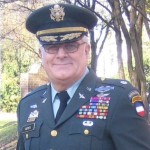 I have been telling you about some of the family connections I have made recently, and how surprised I have been at just who some of these people are. It isn’t always about them being famous, but rather about what amazing things they have done in their lives. So often we don’t hear what our family members have accomplished…mostly because they are too humble to really share all of their accomplishments. Recently, I made a family connection with the Noyes side of my husband, Bob Schulenberg’s family. This would be Bob’s grandmother, Nettie Noyes Knox’s side of the family. The connection was one that in all reality, I stumbled on. I had been searching for information…over a year ago, and I had copied the web addresses of several sites I thought might help, and put them into a Word document. There they sat for far too long. Finally, I found the time to check on one of them, and found the email for Paul Noyes. What an amazing find that was!!
I have been telling you about some of the family connections I have made recently, and how surprised I have been at just who some of these people are. It isn’t always about them being famous, but rather about what amazing things they have done in their lives. So often we don’t hear what our family members have accomplished…mostly because they are too humble to really share all of their accomplishments. Recently, I made a family connection with the Noyes side of my husband, Bob Schulenberg’s family. This would be Bob’s grandmother, Nettie Noyes Knox’s side of the family. The connection was one that in all reality, I stumbled on. I had been searching for information…over a year ago, and I had copied the web addresses of several sites I thought might help, and put them into a Word document. There they sat for far too long. Finally, I found the time to check on one of them, and found the email for Paul Noyes. What an amazing find that was!!
Paul has blessed me with information that I hadn’t found, and I sent him some pictures I had of Noyes family members, to add to his tree. Then he sent back more information on one of the pictures I sent him. He had no idea where that would lead…but I knew, because I had been thinking about a story about him and his family since I received his first response to my email. I love making these new connections, but some of them turn into a great cousinship and friendship too, and those are the most special ones, for sure. I had sent a picture of Eugene Noyes Jr in uniform…but Paul knew from looking at the uniform, that the uniform was from World War II. He knew this because of the 15th Army Air Forces shoulder patch on the uniform. I suppose I might have caught that too, since I had seen my dad’s 8th Army Air Forces shoulder patch, but it was simply something I didn’t notice at all.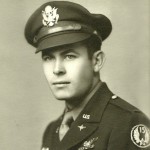
In my defense, I am not a retired after 22 years veteran…and Paul is. Well, that got my curiosity going again. I asked Paul to tell me about his service time. True to the form I have seen with most military men and women…a humble breed…Paul told me a little bit about what he did. He spent most of his 22 year Army career was as an Army aviator. He started out as an Airborne Ranger, then served in Vietnam in Special Forces, where he was wounded. While recovering from the wounds, he was selected for flight school and served in Army Aviation special ops. I did a little research on what Special Operations does exactly, and this is the summary I came up with, “Conduct global special operations missions ranging from precision application of firepower to infiltration, aviation foreign internal defense, exfiltration, resupply and refueling of SOF operational elements.” If you’re like me, that doesn’t clarify much. Upon further research, I found that much of what Special Operations did in Vietnam was to train groups of the Vietnamese Army so they can train the remaining army members. Of course, I am probably generalizing Special Operations to a large degree, and I will have to ask Paul to tell me more about it as soon as I have a chance.
After he was wounded, Paul’s entire career changed when he was selected to become an Army Aviator. Having worked with a pilot for over 18 years now, I have had the opportunity to fly…and I use the term loosely…a small 4 seater plane. Basically what I really did was steer it, and I didn’t do that so well, because it kept climbing, and had to be brought back to level. It was an opportunity given to me with no preparation, and I really enjoyed it. I think to a degree, that is what happened with Paul too. After being wounded, he was given an opportunity to switch gears and do something he never expected to do, and he excelled at it. That is an  awesome career change, and one I look forward to hearing more about.
awesome career change, and one I look forward to hearing more about.
Of course, in a 22 year career, Paul was also building a family. He was married to his lovely wife, Elizabeth, who is an author, and after collaborating with 11 other authors on a book called “A Dozen Apologies”, she released her first book this past August, called “Imperfect Wings”. I look forward to reading both. Paul and Elizabeth have two children, daughter Shari and husband Jimmy Nardello, and their children Cameryn and Reid; and son Chris who is married to Dr Christina Noyes, and they have a son named Owen. I am really looking forward to getting to know these wonderful, new to me cousins as time goes on.
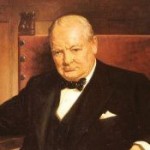 On this day, January 24, 1965, my 15th cousin once removed, Winston Leonard Spencer Churchill passed away. As an eight year old girl, his passing had little impact on my life…then. I wasn’t even aware that he was my cousin, that he had passed away, or of the impact his life had on the people of the world. I especially had no knowledge that as his cousin, I might have been in line for part of his estate, but I was in line for part of it, nevertheless.
On this day, January 24, 1965, my 15th cousin once removed, Winston Leonard Spencer Churchill passed away. As an eight year old girl, his passing had little impact on my life…then. I wasn’t even aware that he was my cousin, that he had passed away, or of the impact his life had on the people of the world. I especially had no knowledge that as his cousin, I might have been in line for part of his estate, but I was in line for part of it, nevertheless.
Of course, in the end, that portion of his estate went to England. From what I am able to gather, Winston Churchill expressed a desire to divide his estate among all of his living relatives…all of them, and believe me, there were a lot of them. The catch was that all of them had to be found or the money went to the state. With family members all over the world, that was a very tall order, and one that would prove fruitless…or at least too big for the task to be completed.
They found our family and the rest of my dad’s side of the family, but somewhere along the way, the search for Winston Churchill’s many family members dwindled to a dead end, and the portion of the estate that was to go to us, was lost to us forever. It’s strange that even then, I knew nothing of the man, the money, or the world-wide search that had taken place. Many have said that perhaps they didn’t search as hard as they should have, and others have said that the search was handled be a disinterested agency. Whatever the case may be, the search failed to find everyone it needed to locate, and that was the end of the story.
I seriously doubt if the money, no matter how substantial, carried a huge impact of the wealth of England or the English Crown. I don’t know how much would have gone to each of the many relatives who were living at that time. It may have been such an insignificant amount that it would have gone almost unnoticed…or maybe it would have been enough change the life of every one of them forever. We will never know, because we don’t know the amount, for sure, or how many would have benefitted from it.
In later years, after I learned of the strangeness of Winston Spencer Churchill’s will, and of his relationship to me, and my part in his will, I wondered why he would have written such a will. He must have known how hard it would be to carry out his last request. He must have assumed that the share each person would receive would be small, at best. So, why would he write such a will? I’m sure he had his reasons, and I am just as sure that we will never know them, but I have never stopped wondering. I’m sure people would think that I wonder about it, because I’m sorry I didn’t get a share of the money, but in reality, it is my opinion that money is a tool to get the things you need, and to bless those around you. All too often, when handed a large amount of  money with no understanding that happiness does not come as a side effect of having it, money ends up ruining the life of the person who received it. So does that mean that I’m against wealth…certainly not. I just think that money has a place, and it makes a great tool, but a terrible master.
money with no understanding that happiness does not come as a side effect of having it, money ends up ruining the life of the person who received it. So does that mean that I’m against wealth…certainly not. I just think that money has a place, and it makes a great tool, but a terrible master.
I have great respect for Winston Spencer Churchill. His abilities, especially in winning wars are well known. I don’t believe he was crazy when he wrote out his will either, but was maybe a man who felt that he could do some measure of good for those who were his family, and by requiring that all be found, he eliminated the ability to leave his inheritance to a chosen few…just in case they were tempted not to look further.

